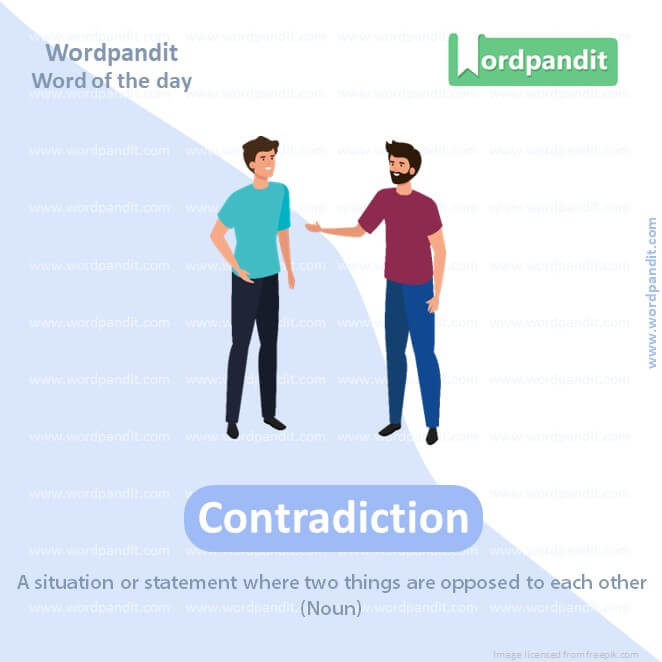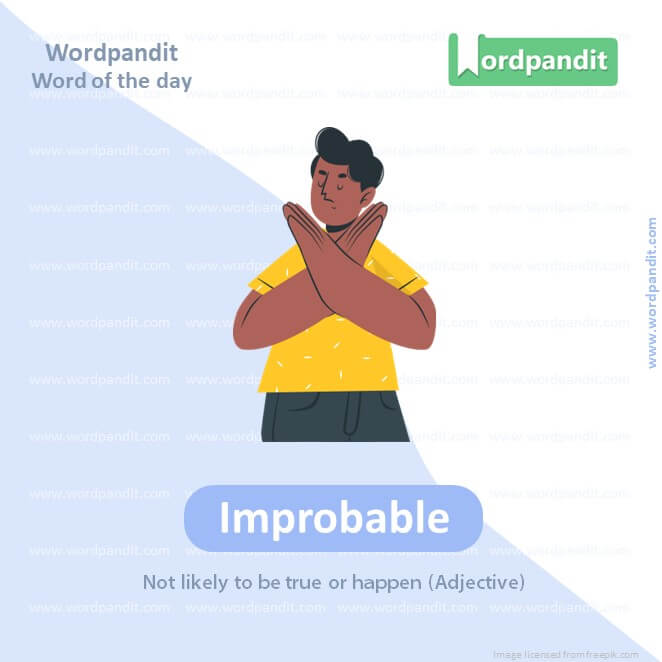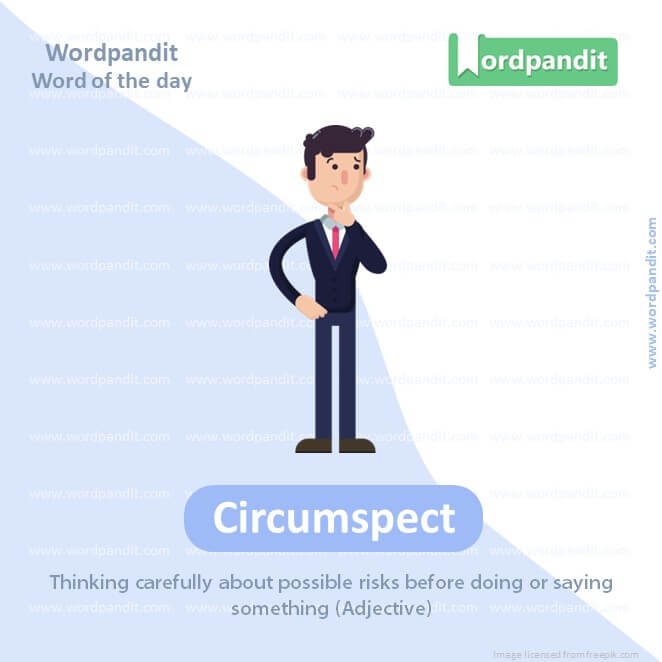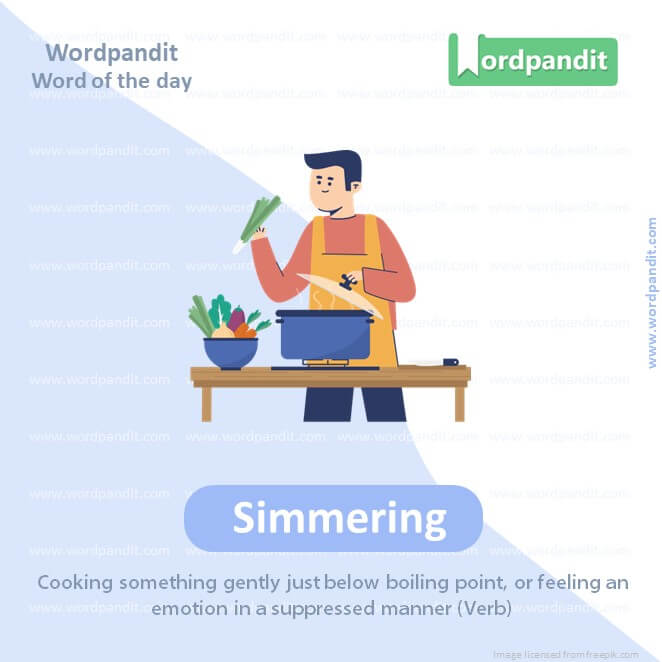Daily Vocabulary Words: List of Daily Used Words
Hi there. Welcome to this special section @ Wordpandit.
Our endeavour here is straightforward: highlighting important daily vocabulary words, you would encounter in The Hindu. This is your repository of commonly used words; essentially, we are posting a list of daily used words. Hence, this has significant practical application as it teaches you words that are commonly used in a leading publication such as The Hindu.
Visit the website daily to learn words from The Hindu.
WORD-1: Stabilising
CONTEXT: The junta’s violence has done little in stabilising the country.
SOURCE: The Hindu
EXPLANATORY PARAGRAPH: Imagine you’re building a tower with your blocks, and it starts to wobble. If you add more blocks at the bottom to make it steady, you are stabilising it. Stabilising means making something steady or balanced so it doesn’t fall or change too much.
MEANING: Making something steady or less likely to change (Verb).
PRONUNCIATION: “stay-buh-lie-zing”.
SYNONYMS: Balancing, steadying, securing, anchoring, solidifying.
USAGE EXAMPLES:
1. Dad is stabilising the table so it doesn’t wobble.
2. The doctor gave medicine to help stabilise her fever.
3. They are stabilising the economy by introducing new laws.
4. We are stabilising the boat to prevent it from tipping over.

WORD-2: Contradiction
CONTEXT: the main political contradiction in Burmese society was the peaceful struggle by the pro-democracy movement, led by Ms. Suu Kyi.
SOURCE: The Hindu
EXPLANATORY PARAGRAPH: Contradiction is when two things don’t match or agree. Like if you say, “I love ice cream” but then say, “I don’t like any sweets.” These two ideas don’t fit together well, that’s a contradiction.
MEANING: A situation or statement where two things are opposed to each other (Noun).
PRONUNCIATION: “kon-truh-dik-shun”.
SYNONYMS: Conflict, inconsistency, discrepancy, opposition, paradox.
USAGE EXAMPLES:
1. Saying it’s raining when it’s sunny is a contradiction.
2. He faced a contradiction between what he wanted and what was right.
3. Her statement was a contradiction to the evidence.
4. The book was full of contradictions.

WORD-3: Improbable
CONTEXT: The junta does not have any easy options. A military solution looks improbable.
SOURCE: The Hindu
EXPLANATORY PARAGRAPH: Improbable means something that’s not likely to happen. Like seeing an elephant flying in the sky is improbable because elephants can’t fly.
MEANING: Not likely to be true or happen (Adjective).
PRONUNCIATION: “im-prob-uh-bul”.
SYNONYMS: Unlikely, doubtful, implausible, far-fetched, questionable.
USAGE EXAMPLES:
1. It’s improbable that we’ll have snow in summer.
2. They won an improbable victory in the game.
3. Finding a dinosaur bone in our backyard is improbable.
4. He made an improbable claim about meeting a movie star.
WORD-4: Repercussions
CONTEXT: If the violence continues, especially in areas bordering India and China, it will have regional repercussions.
SOURCE: The Hindu
EXPLANATORY PARAGRAPH: Repercussions are things that happen because of something else you did. Like if you don’t sleep early, you might be tired the next day. Being tired is a repercussion of staying up late.
MEANING: The effects or consequences of an action (Noun).
PRONUNCIATION: “ree-per-kush-uhns”.
SYNONYMS: Consequences, aftermath, effects, results, fallout.
USAGE EXAMPLES:
1. The repercussions of eating too much candy are toothaches.
2. His actions had serious repercussions for the team.
3. They didn’t think about the repercussions of their decision.
4. The environmental repercussions of pollution are worrying.
WORD-5: Proactive
CONTEXT: Major regional players, along with ASEAN, should play a more proactive role to achieve a ceasefire in Myanmar, setting the stage for meaningful dialogue that is aimed at restoring democracy and freedoms.
SOURCE: The Hindu
EXPLANATORY PARAGRAPH: Being proactive is like being a superhero who stops problems before they happen. Instead of waiting for something to go wrong, you do something about it first to make sure everything goes right.
MEANING: Taking action by causing change and not only reacting to change when it happens (Adjective).
PRONUNCIATION: “pro-ak-tiv”.
SYNONYMS: Preventative, anticipatory, initiative, forward-thinking, pre-emptive.
USAGE EXAMPLES:
1. She was proactive in studying for the test a week early.
2. Being proactive can prevent many problems.
3. The company’s proactive approach saved them time and money.
4. He took a proactive role in his health by exercising daily.

WORD-6: Circumspect
CONTEXT: the Russians were extremely circumspect about having close ties with China because of their memories of the Cold War during which the Chinese had sided with the U.S. But with the imposition of economic sanctions.
SOURCE: The Hindu
EXPLANATORY PARAGRAPH: Being circumspect is like being a detective looking carefully around, thinking about all the things that could happen before making a decision. It means you think a lot before doing something so you can be safe.
MEANING: Thinking carefully about possible risks before doing or saying something (Adjective).
PRONUNCIATION: “sir-cum-spekt”.
SYNONYMS: Cautious, careful, wary, prudent, guarded.
USAGE EXAMPLES:
1. She was circumspect about investing her money.
2. The circumspect hiker avoided the risky path.
3. He was circumspect in his choice of words.
4. The decision requires a circumspect approach.

WORD-7: Simmering
CONTEXT: There are still simmering undercurrents of mistrust between the two sides, particularly regarding the balance of power in Central Asia.
SOURCE: The Hindu
EXPLANATORY PARAGRAPH: Simmering is like when soup is cooking on low heat. It’s not boiling or very hot, but it’s still cooking slowly with little bubbles. It can also mean feeling angry or upset in a quiet way, like when you’re a little mad but not yelling.
MEANING: Cooking something gently just below boiling point, or feeling an emotion in a suppressed manner (Verb).
PRONUNCIATION: “sim-er-ing”.
SYNONYMS: Stewing, brewing, seething, smoldering, heating.
USAGE EXAMPLES:
1. Grandma is simmering the soup on the stove.
2. There was simmering anger in the room.
3. She kept her frustration simmering inside.
4. The issue has been simmering for a while.

WORD-8: Reinventing
CONTEXT: The Russians are seriously looking at reinventing their ties with India.
SOURCE: The Hindu
EXPLANATORY PARAGRAPH: Reinventing is like taking something old and making it new and different. It’s like if you take a box and paint it and add wheels to make it into a car. You’re reinventing the box into something else.
MEANING: Changing something so much that it seems entirely new (Verb).
PRONUNCIATION: “ree-in-vent-ing”.
SYNONYMS: Transforming, revamping, overhauling, renewing, reworking.
USAGE EXAMPLES:
1. She is reinventing her old clothes into new styles.
2. The café was reinvented into a modern space.
3. Reinventing the business was a smart move.
4. He enjoyed reinventing classic recipes.
WORD-9: Manoeuvrability
CONTEXT: it does reduce the manoeuvrability of India in terms of how to manage good relations with Russia, China, and the U.S.
SOURCE: The Hindu
EXPLANATORY PARAGRAPH: Manoeuvrability means being able to move or turn easily. Like when you’re playing with a toy car that can turn and twist in lots of directions, it has good manoeuvrability.
MEANING: The ability to be moved or directed easily (Noun).
PRONUNCIATION: “muh-noo-ver-uh-bil-uh-tee”.
SYNONYMS: Agility, flexibility, mobility, nimbleness, dexterity.
USAGE EXAMPLES:
1. The small car’s manoeuvrability made it perfect for city driving.
2. The robot’s manoeuvrability amazed everyone.
3. Good manoeuvrability is important in sports.
4. The phone’s compact size gives it great manoeuvrability.
WORD-10 Foreseeable
CONTEXT: In the foreseeable future, I do not visualise any major breakthrough on the border aspect.
SOURCE: The Hindu
EXPLANATORY PARAGRAPH: Foreseeable is like being able to look into the future and know what might happen. It’s when you can guess or predict what is going to happen soon, like knowing it will rain because you see dark clouds.
MEANING: Able to be predicted or expected (Adjective).
PRONUNCIATION: “for-see-uh-bul”.
SYNONYMS: Predictable, expected, anticipated, likely, probable.
USAGE EXAMPLES:
1. In the foreseeable future, robots could become more common.
2. There are no changes foreseeable in the next few months.
3. The project’s success is foreseeable.
4. He has no foreseeable plans to retire.
Vocabulary English Grammar
Delving into the vast universe of language learning, the ‘Vocabulary English Grammar’ acts as a beacon, illuminating the path to mastery. This synergy of words and rules forms the quintessential framework of the English language. However, understanding ‘Vocabulary English Grammar’ in-depth requires a fine-tuned strategy.
First and foremost, understanding ‘Vocabulary English Grammar’ goes beyond only remembering rules and words. It involves learning how a word functions in a grammatical context. To achieve this, resources like textbooks, online grammar guides, and interactive language learning apps prove to be very valuable.
However, embracing ‘Vocabulary English Grammar’ calls for consistent practice. Adopting thematic learning, where you concentrate on a specific grammatical concept and the vocabulary related to it, can be particularly effective. Reading material like articles and books, or engaging with podcasts and films can provide a real-world context to these concepts.
The key to mastering ‘Vocabulary English Grammar’ lies in constructing sentences. Instead of memorizing disconnected words and rules, start framing sentences. This active application significantly bolsters comprehension and provides practical insight into how grammatical rules govern the use of words.
To truly excel in ‘Vocabulary English Grammar’, it’s important to seek feedback. Participate in language exchange platforms or conversation clubs. These platforms provide an opportunity to apply what you’ve learned and obtain constructive feedback on your progress.
In essence, understanding ‘Vocabulary English Grammar’ is a step-by-step process that requires thoughtful learning, constant practice, application, and proactive feedback. By embedding these techniques into your language learning routine, you can confidently navigate ‘Vocabulary English Grammar’. Remember, mastering ‘Vocabulary English Grammar’ is not about perfection, but about progression and communication. Each rule learned, each word comprehended, brings you closer to the fluency in your English language journey.










